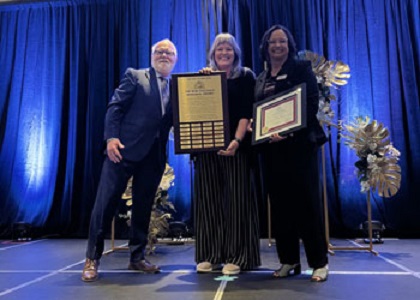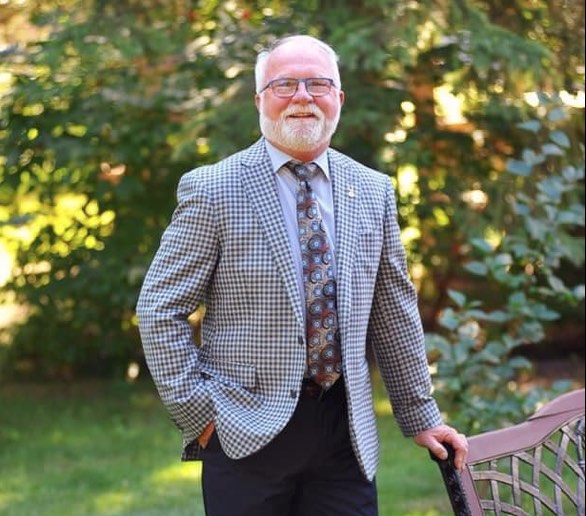City of Red Deer
Leadership Team sets these top 6 Community Safety Priorities

From The City of Red Deer
Collaborative team announces community safety priorities
The Systems Leadership Team (SLT), a group of community leaders working collaboratively on a coordinated approach to broad community safety issues, announced their “Top 6 in 6” – the priorities they will be focusing on in the next six months.
These priorities were developed following a Safety Summit that took place in June. Over 100 people participated in the Summit, providing feedback to inform the direction for SLT. Using this information, along with data from past community consultations, SLT developed Community Safety Action Areas, and priorities within each action area. The “Top 6 in 6” are the immediate priorities SLT will focus on in the next six months.
- System Innovation: A central coordination model that enhances collaboration and facilitates knowledge sharing to identify gaps and prevent unnecessary duplication of services.
- 1) Top 6 in 6 priority: Create a central coordination, governance and integration model that enhances collaboration and knowledge sharing.
- People-Centred Approaches: Strengthen and streamline population-based strategies, which include trauma and culturally-informed practices, to better focus on client needs.
- 2) Top 6 in 6 priority: Ensure intake processes are streamlined.
- 3) Top 6 in 6 priority: Develop a trauma-informed workforce to enhance outcomes for clients.
- Community Mobilization: Enhanced communication between agencies, systems, and greater community to create common understandings and facilitate/create opportunities for community change.
- 4) Top 6 in 6 priority: Enhancing communication between systems, agencies, and community.
- Coordinate New and Existing Resources: Create innovative funding opportunities and data integration strategies to support long-term sustainability and more efficient use of allocated resources.
- 5) Top 6 in 6 priority: Drive data and information sharing, retention and access.
- 6) Top 6 in 6 priority: Ensure long-term funding stability/innovation.
SLT is focused on community safety, identifying system gaps, potential solutions and opportunities for strategies that enable a more collaborative approach to the community safety challenges Red Deerians are currently facing. It is made up of representatives from The City of Red Deer, Red Deer RCMP, Red Deer Catholic Regional Schools, Red Deer Public Schools, Urban Aboriginal Voices Society, Alberta Health Services – Central Zone, Children’s Services – Central Region.
In the coming months, a Community Integration Team, an operational team of the SLT, will be working to implement these action items.
SLT leader quotes:
“Community safety is The City’s number one priority, and our work with SLT is critical to ensuring that efforts across the community are coordinated and we are working collaboratively to achieve the same goals and outcomes. These SLT priorities will transform how our systems integrate and function to serve our citizens in the long-term. Combined with the solutions and actions we have heard from the community through our recent crime and community safety engagement initiatives, I am confident that we can make strides toward improving safety for everyone in Red Deer.” – Allan Seabrooke, City Manager, The City of Red Deer
“The RCMP strongly values the SLT partnership and recognizes the importance of working collaboratively in the community. With this collaborative approach at the core of the SLT mandate, we are now ready to implement our immediate priorities, which will have broad reaching impact across the community. There are many agencies involved in community safety who will play a role in delivering these priorities, and our role as system leaders will be to ensure these agencies have the necessary resources and support in place. It’s only when we’re working together that we will start to see progress on our community safety goals. ” – Gerald Grobmeier, Superintendent, Red Deer RCMP
“Being a member of the System Leadership Team (SLT) has demonstrated Red Deer Catholic Regional School Division’s continued willingness to work with other local agencies and organizations for the betterment of our community. The SLT is a dedicated group of people who strive to develop innovative and necessary solutions to create a safe place for everyone in our community. Our ability to work collaboratively together to share knowledge and expertise exemplifies our commitment to improving our community.” – Paul Mason, Superintendent, Red Deer Catholic Regional Schools
“Red Deer Public School District sees great value in coordinating our community’s work around community safety. By working proactively and collaboratively today, we can build a stronger community for tomorrow. So many agencies in our community are working so hard on key issues, and by working in a more coordinated way, we can be more effective!” – Stu Henry, Superintendent and Chad Erickson, Student Services – Associate Superintendent, Red Deer Public School District
“Urban Aboriginal Voices Society (UAVS) is excited to be coming together with system leaders to enhance community safety. Our hope is that through increased collaboration and implementation of priority actions, we will be able to speak and act with a united voice on issues and concerns affecting our community.” – Maggie Loney, Co-Chair Leadership Circle, UAVS
“Alberta Health Services (AHS) is pleased to be a member of the Systems Leadership Team in Red Deer and we look forward to continuing to work with our partners on these priority areas over the coming months. The issue of community safety is multi-faceted, and enhancing it is a big job. No single approach nor one organization working alone will have all the answers. But by working together towards common goals, we can build on each other’s strengths and resources, and enhance the way we all work as one. Together we can create opportunities for positive, meaningful change within our community.” – Janice Stewart – Chief Zone Officer, AHS, Central Zone
“The turnout and input from community agencies and organizations showed passion to work collaboratively to build a healthier and safer community. It is exciting to see contributions from the summit come together to create an action plan. I want to thank participants for laying the groundwork to serve our community better. ” – Peggy Olstad, Associate Director, Childrens Services – Central Region
City of Red Deer
City of Red Deer Employee Honoured with Bob Stollings Memorial Award for Outstanding Contributions

Annette Scheper, Community & Program Facilitator in the Safe & Healthy Communities Department is The City’s 2025 recipient of the Bob Stollings Memorial Award.
The Bob Stollings Memorial Award is given out each year to a City employee who displays outstanding performance in alignment with The City’s RISE cornerstone values – respect, integrity, service and excellence. Nominations for the award are submitted by fellow coworkers detailing the employee’s achievements professionally and interpersonally, along with letters of support. The award is considered a great honour among City staff.
With an impressive 22-year career, Annette has played a pivotal role in shaping Red Deer’s cultural and special events landscape. Her leadership and innovation have brought thousands of successful events to life, creating lasting traditions that enrich the lives of residents. Her commitment to excellence and resourcefulness has ensured that community initiatives are inclusive, accessible, and impactful.
One of Annette’s most notable achievements is the development of the Community Loan Program, which provides essential resources for local groups, contributing an annual value of $86,778.95 back into the community. In addition, she has successfully led and executed a variety of large-scale events, demonstrating remarkable problem-solving skills and a dedication to sustainability. From creating elaborate event designs with repurposed materials to managing complex logistics, she continuously sets the standard for excellence.
“Annette exemplifies the best of our organization,” said City Manager, Tara Lodewyk. “Her unwavering dedication, innovative thinking, and ability to bring people together has made a profound impact on our city. This award is a testament to her hard work and passion for creating meaningful experiences for our community.”
The Bob Stollings Memorial Award was first established in 1985 and is presented every year to honour Robert (Bob) E. Stollings, a loyal and dedicated City employee from 1960-1984.
City of Red Deer
Red Deer will choose a new Mayor as Ken Johnston decides to step away

It’s a telling detail about the person who leads Red Deer City Council. Always putting the city’s needs ahead of his own, Mayor Ken Johnston has announced his intentions within days of the opening of Nominations for October’s municipal elections,
After 12 years on council, Mayor Ken Johnston has decided against running for a second term as Mayor this fall. Johnson shared his decision in front of colleagues and supporters in a touching announcement on Wednesday.
At 71 years old, Johnston remains vibrant, passionate and healthy. He says that’s exactly why he and his wife Carolyn have decided now is the right time to start their next stage of life together.
Mayor Johnston listed a number of highlights and achievements he can look back on, including his help advocating for the redevelopment of Red Deer Regional Hospital, the growth of Red Deer Polytechnic, and positive moves in Economic Development.
All these lead of a feeling of ease about the decision to step away, though affordable housing and a permanent shelter for the homeless remain pressing concerns.
With about 8 months remaining in his term, Mayor Johnston is planning to push hard to move the needle on these housing issues.
“We’re looking forward to some more work and we’ll be going to the community shortly about it. So I still have optimism that maybe before the term is out we can have an announcement.”
This is the second major political announcement in Central Alberta in the last number of days. Earlier this week Red Deer Mountain View MP Earl Dreeshen announced he won’t be running in the next federal election.
-

 Crime2 days ago
Crime2 days ago“This is a total fucking disaster”
-

 Fraser Institute1 day ago
Fraser Institute1 day agoBefore Trudeau average annual immigration was 617,800. Under Trudeau number skyrocketted to 1.4 million annually
-

 International2 days ago
International2 days agoChicago suburb purchases childhood home of Pope Leo XIV
-

 Daily Caller2 days ago
Daily Caller2 days ago‘I Know How These People Operate’: Fmr CIA Officer Calls BS On FBI’s New Epstein Intel
-

 MAiD2 days ago
MAiD2 days agoCanada’s euthanasia regime is already killing the disabled. It’s about to get worse
-

 Daily Caller2 days ago
Daily Caller2 days agoBlackouts Coming If America Continues With Biden-Era Green Frenzy, Trump Admin Warns
-

 Red Deer2 days ago
Red Deer2 days agoJoin SPARC in spreading kindness by July 14th
-

 Business1 day ago
Business1 day agoPrime minister can make good on campaign promise by reforming Canada Health Act





